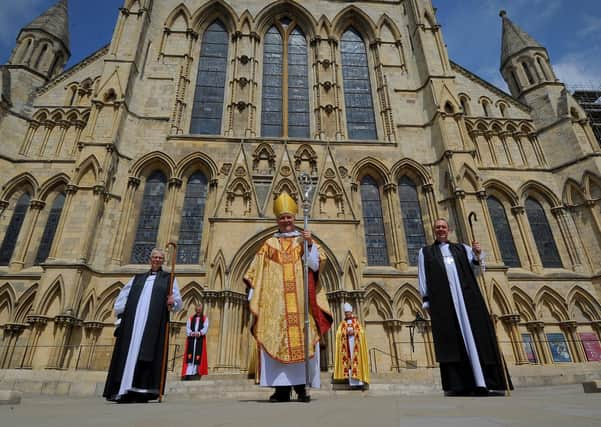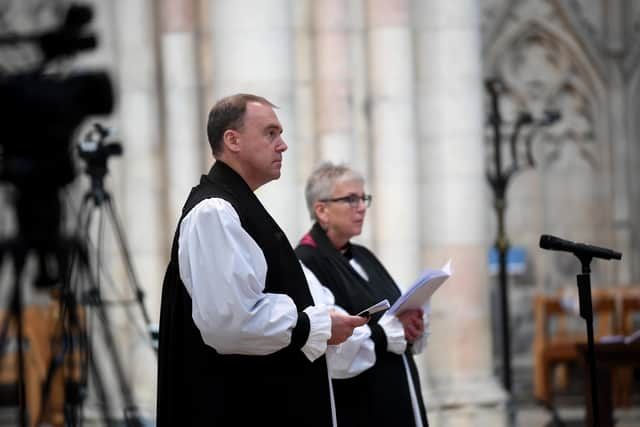Why ‘Reverend’ and other clergy titles symbolise out-of-touch church – David Harris


More poignant is the suggestion that it has, in a small number of cases, allowed abuse to be covered up and the voices of the vulnerable to be silenced.
Of course, it is not only the Church of England that uses the term ‘Reverend’ to describe its clerics, and in the event of the General Synod consenting to this, other denominations would be encouraged to have similar conversations.
Advertisement
Hide AdAdvertisement
Hide AdThe term originally comes from the Latin word reverendus, meaning a person who should be held in reverence.


So, a ‘Reverend’ is someone who should be seen as worthy of our respect and revered by us by virtue of their position within a church.
There appear to be degrees of reverence with some clerics being referred to as ‘Right Reverend’, or even ‘Venerable’.
At one level, I don’t care what church leaders call themselves, but I am uncomfortable with the notion that some of my fellow Christians are regarded as more ‘reverend than thou’.
Advertisement
Hide AdAdvertisement
Hide AdWe need to be prepared to challenge the view that those who are ‘Reverend’ are beyond question or reproach, particularly when it comes to issues such as abuse.
Some of my best friends hold the title ‘Reverend,’ but neither they nor I would sustain the view that they are naturally morally superior to the rest of us.
So, I watch with interest as the Church of England Synod consider whether the term ‘Reverend’ still has a place in 21st century Christianity.
And it’s not just the term ‘Reverend’ that needs to be re-thought.
Advertisement
Hide AdAdvertisement
Hide AdI am an accredited ‘local preacher’ within the Methodist Church which includes delivering sermons, verbally and in writing.
A non-Christian friend recently said she was interested in what I had to say (some of the time), but finds the term ‘sermon’ presumptuous and distancing.
My dictionary has two definitions of a sermon. The first is ‘an oration or a lecture by a preacher’.
I’m not sure I see myself as giving weekly orations or lectures, but I can see where the definition comes from.
Advertisement
Hide AdAdvertisement
Hide AdThe second definition in the same dictionary is more hard hitting – ‘a lengthy or tedious reproof or exhortation’.
I have certainly sat through sermons like that, and I suspect there are people who have listened to me who would say the same.
For some time, I have tried not to use the term ‘sermon,’ opting instead for ‘talk;’ or ‘thoughts; or ‘discussion’ in relation to what I try to do. Some churches I go to are more accepting of this than others.
Quite often, individual church stewards will change the title of what I have sent them from ‘talk’ to ‘sermon’ on the printed information given to the congregation.
And whilst we are at it, what do we mean by ‘preaching?’
Advertisement
Hide AdAdvertisement
Hide AdThe same dictionary referred to above defines preaching as ‘religious or moral instruction, especially in a drawn out, tedious manner’.
To preach at, or to, someone implies an unequal relationship with one side dispensing moral instruction, whether or not in a drawn out, tedious manner.
It is time for a complete rethink of the words we use when describing what it is to be Christian communities in the 21st century.
We are people seeking to live Christian lives and helping each other along in our individual and collective journeys.
Advertisement
Hide AdAdvertisement
Hide AdWe don’t seek to develop hierarchies based on levels of reverence; with most of us being merely receivers of ‘lengthy or tedious reproofs or exhortations’.
We do seek to be a people learning together and supporting each other as we go forward as seekers of truth, and developing our knowledge, understanding and relationship with God.
David Harris is a lay preacher in Sheffield.
Support The Yorkshire Post and become a subscriber today. Your subscription will help us to continue to bring quality news to the people of Yorkshire. In return, you’ll see fewer ads on site, get free access to our app and receive exclusive members-only offers. Click here to subscribe.
Comment Guidelines
National World encourages reader discussion on our stories. User feedback, insights and back-and-forth exchanges add a rich layer of context to reporting. Please review our Community Guidelines before commenting.